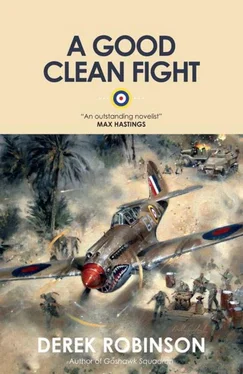“Let’s knock it down if we can,” Lampard said, “but if anyone fires he’s got to hit it. Otherwise we leave it alone.” The men hurried to their vehicles and peeled the dust covers from the Vickers twin machine guns.
The buzz approached, altered its tone, faded, returned, changed tone again. “Box search?” Gibbon said to his driver. “Sounds like it,” the driver said. In a box search the aircraft flew a series of rectangles, each one butted against the last, slowly working its way along a route.
And then they saw it, soft as a moth, all detail fogged out by the heat-haze.
“Too high,” Lampard said to Dunn. “He can’t see anything from up there, not through this soup. That’s blindingly obvious.”
The noise dwindled and the silhouette dissolved to nothing. “Fathead,” Lampard said. “Right, off we go. Five miles an hour and keep it quiet.” The patrol moved off.
* * *
In the Storch the passenger sat behind the pilot. Paul Schramm leaned forward and pointed at the altimeter. “Lose some height,” he said. “Lose a lot of height, in fact. I’ll never see anything from up here.”
“You’ll see even less if I go into that muck.”
“Let’s try, anyway.”
The pilot turned the plane through a right angle as easily as if he were swinging on a lamppost, and leveled out, but he did not lose height.
“They’re down there somewhere,” Schramm said. “I know it. What are you afraid of?”
“I don’t trust this squalid altimeter,” the pilot said.
“For Christ’s sake! It got us over the Jebel! Besides, there’s nothing near here to fly into. It’s all just desert.”
“Maybe. This wreck was being pulled apart in a hangar only an hour ago. I bet they bust the altimeter. Bet they forgot to reset it.”
“Looks good to me.”
“Anyway, there’s desert and desert. I’ve seen dunes a hundred meters high in the Calanscio.” He meant the Sand Sea that formed the eastern side of the Jalo Gap. It did indeed look like a sea: a succession of monstrously heaving waves and swells.
“We’re nowhere near the Calanscio,” Schramm said. “We’re in the Gap, aren’t we?”
“I don’t trust that squalid compass,” the pilot said. “There’s something peculiar about it.” He swung onto another leg of the search and watched the compass react. “Damned mechanics,” he muttered. “First thing they do is bust the compass.”
Schramm lost patience. “Get down there,” he ordered. “Or I’ll have you court-martialled.”
The pilot sighed and eased the control column forward. The haze gradually thickened until it was like flying through industrial smog, yellow-brown, quivering with dust. Visibility was so bad that it was impossible to tell where the haze ended and the desert began. The horizon wasn’t much help: just a blur where brown-yellow turned to yellow-brown. “We’re down,” the pilot grunted. “Hope you like it.”
For ten minutes they searched and saw nothing. By then they both knew they were through the Gap and on the edge of the open desert, with the Calanscio receding to their left and Jalo Oasis falling behind to their right. Schramm realized now what a barren idea this search had been. Guessing where the enemy was didn’t necessarily mean you could do anything about it.
“You know this wreck flies on fuel, don’t you?” said the pilot.
“I know.” Schramm glanced at the gauge. Low.
“You can’t trust that,” the pilot said. “First thing they do is bust the fuel gauge.”
“All right. Since we’ve got to go back, let’s stay down and look for wheel tracks.”
“Is that all you want? Christ, if that’s all you want I can show you dozens of them, hundreds. It’s like an autobahn down there, next exit five hundred kilometers south, Kufra. Our Latin comrades used to have a garrison down at Kufra, you know.”
“I know.”
“That was before the British turned up.”
“I know that too.”
“First thing the British do is bust the Italians.”
“I’ve heard enough from you,” Schramm said. “Just drive the bus.”
The plane flew north. The pilot had been right: tire tracks were everywhere. Some were obviously old, partly smoothed by the wind, but many were new. Or looked new. Schramm despaired. A month, a week, five minutes; who could tell the difference? Then the pilot nudged him. Schramm looked where the pilot was looking, away to the left. Five square blobs on wheels. “Get closer,” he said.
The pilot circled, edging slightly inwards. The vehicles were moving very slowly.
“Could be an Italian patrol,” Schramm said. “I can’t tell from here.”
“British trucks. Look at the silhouettes.”
“That proves nothing. We captured hundreds of them. Get closer.”
“If I get any closer and they’re not Italian, we’re dead.”
Schramm tried to focus his binoculars on the hazy shapes, but all he got was bigger hazy shapes. “It’s got to be them,” he muttered. “I’m not going back without…” But he couldn’t complete the sentence. He felt slightly sick. Maybe the doctor’s injection was wearing off; certainly the pain had come back, as if an electric fire had been brought too close to his feet. Or maybe the sickness was the effect of all this circling with no clear horizon to cling to. For a wretched moment, Schramm suffered the illusion of hanging motionless while the rest of the world swung hugely and helplessly around him. He shut his eyes.
“Fifty-fifty that’s an Italian patrol looking for your British friends,” the pilot said. “Fifty-fifty it isn’t.”
“All right.” Schramm was too weak to argue. “We’ll report it to Barce as a possible target and go home. Let them make the decision.”
“Send the message now?”
Schramm opened his eyes. “Yes, now.”
“I’ll have to take her up five hundred meters. This isn’t the greatest radio in the world.”
“So do it.”
Schramm’s body was angled back as the nose came up, and his head got gently tilted until it rested on the seat top. The position was soothing. Nothing more to be done. Over to the professionals now. “Oh, you bitch,” the pilot muttered. Schramm compelled his mind to alert itself, and grudgingly his mind responded. “What’s wrong?” he asked.
The nose was going down again. The pilot was fussing with the controls, nudging the throttle a fraction forward and half a fraction back, cocking his head to test the engine note as he glanced up at the wings. “She won’t climb,” he said. “We nearly stalled. I can’t get any lift.”
“You mean there’s a fault somewhere?” Schramm heard the foolishness in his words and struggled to recover control of himself and his situation. “Forget the signal,” he said. “Make for Agedabia. We can land there.” Agedabia was about a hundred kilometers south of Benghazi. The land between Jalo and Agedabia was fairly flat. The pilot was shaking his head, not in answer to Schramm but as a verdict on the performance of the Storch. “She is not a happy airplane,” he said. “People have not been kind to her, and now she doesn’t want to fly any more.”
* * *
The five vehicles of the patrol had stopped and their engines had been turned off. Nobody spoke. They all sat and looked at the haze, which was beginning to lift, but still it was like looking at a hot and hazy nothingness. They listened to the sound of the desert, but this was a hopeless mismatch because the desert had been practicing its silence for tens of thousands of years. The desert was a master of silence. They were novices.
Dunn got down from his truck and walked over to Lampard’s armed jeep. The scuffing of his boots was noisy. Lampard sat upright, only his head moving as he hunted for sound. Dunn waited. He could feel sweat trickling inside his ears.
Читать дальше












